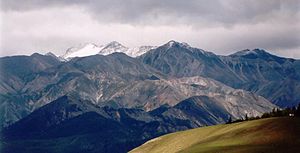The Sayan Alpine meadows and tundra ecoregion (WWF ID: PA1016) is an ecoregion that covers the high areas of the Sayan Mountains above the treeline, between the Altai Mountains in the west and Lake Baikal in the east. The area is remote and protects diverse species of alpine flora and fauna. It has an area of 846,149 square kilometres (326,700 sq mi).[1] [2]
| Sayan Alpine meadows and tundra | |
|---|---|
 Eastern Sayan Mountains | |
 Ecoregion territory (in purple) | |
| Ecology | |
| Realm | Palearctic |
| Biome | montane grasslands and shrublands |
| Borders | |
| Geography | |
| Area | 846,149 km2 (326,700 sq mi) |
| Countries | |
| Coordinates | 51°45′N 96°15′E / 51.75°N 96.25°E |
Location and description edit
The ecoregions covers the terrain above the treeline in the high ranges of the Western Sayan Mountains, in the Altai Republic, and the Eastern Sayan Mountains, reaching almost to Irkutsk. There are also some high areas in northern Mongolia. This ecoregion is characterized by glacially-carved valleys with an upland mosaic landscape of alpine meadows.
Climate edit
The region has a subalpine climate (Köppen Dfc). This climate is characterized by high variation in temperature, both daily and seasonally; with long, cold winters and short, cool summers with one to three months averaging at least 10 °C or 50 °F. Mean precipitation is about 500 millimetres (20 in)/year. The mean temperature at the center of the ecoregion is −29.5 °C (−21.1 °F) in January, and 13 °C (55 °F) in July.[3]
Flora and fauna edit
Both plant and animal diversity is high, as the area is relatively protected by its remoteness and by its position at the meeting places of different ecological zones. From treeline up to the barren rock zone, alpine meadows and associated species predominate.
Protections edit
There are two significant nationally protected area that reach into this ecoregion:
- Altai Nature Reserve, which has populations of Snow leopard, and Argali, among other threatened species,
- Azas Nature Reserve, with bald mountain tundra and alpine meadows representing about 16% of the reserve.
See also edit
References edit
- ^ "Sayan Alpine meadows and tundra". GlobalSpecies.org. Retrieved November 20, 2018.
- ^ "Central Asia: Southern Russia into Mongolia". World Wildlife Federation. Retrieved November 20, 2018.
- ^ "Climate Data for Latitude 51.75 Longitude 96.25". GlobalSpecies.org. Retrieved December 13, 2018.